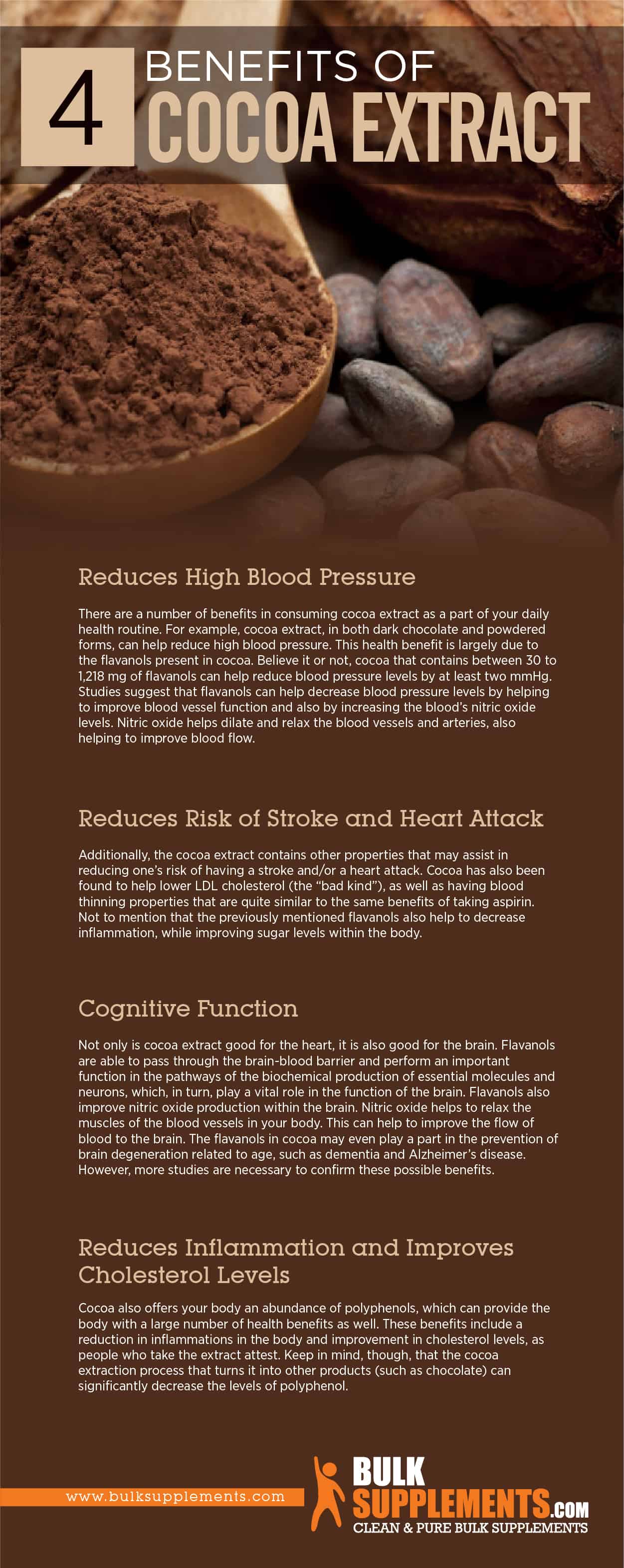Cocoa Extract: Benefits, Side Effects & Dosage
by James Denlinger Digital Marketing StrategistWhat is Cocoa Extract?
Cocoa extract, though boasting a chocolaty taste, is a bitter mix comprising of xanthine molecules and procyanidins. Cocoa extract comes from, of course, cocoa beans, through a process of crushing or grinding the beans and then eliminating the butter or fat from the cocoa. Those who opt to supplement with cocoa extract have noted a great number of health-related benefits. These include improvements in their cognition, cardiovascular system and, consequently, in blood circulation. These benefits are largely thanks to the antioxidants present in cocoa extract.
Many people assume that there is no difference between the words “cacao” and “cocoa.” However, there is a significant difference. Raw cocoa extract is cacao that has been pressed to eliminate the fat, but is then roasted at high heat. Raw cacao, though, is extracted by way of cold-pressing the unroasted cacao beans to keep living enzymes, while still eliminating the fat.
Cocoa is most certainly something that many people are familiar with. It is easily one of the most well-known ingredients in the world. However, very few people are aware of the health benefits that cocoa extract has to offer.
Cocoa Extract Benefits
Reduces High Blood Pressure
There are a number of benefits in consuming cocoa extract as a part of your daily health routine. For example, cocoa extract, in both dark chocolate and powdered forms, can help reduce high blood pressure. This health benefit is largely due to the flavanols present in cocoa. Believe it or not, cocoa that contains between 30 to 1,218 mg of flavanols can help reduce blood pressure levels by at least two mmHg. Studies suggest that flavanols can help decrease blood pressure levels by helping to improve blood vessel function and also by increasing the blood’s nitric oxide levels. Nitric oxide helps dilate and relax the blood vessels and arteries, also helping to improve blood flow.
Reduces Risk of Stroke and Heart Attack
Additionally, the cocoa extract contains other properties that may assist in reducing one’s risk of having a stroke and/or a heart attack. Cocoa has also been found to help lower LDL cholesterol (the “bad kind”), as well as having blood thinning properties that are quite similar to the same benefits of taking aspirin. Not to mention that the previously mentioned flavanols also help to decrease inflammation, while improving sugar levels within the body.
Cognitive Function
Not only is cocoa extract good for the heart, it is also good for the brain. Flavanols are able to pass through the brain-blood barrier and perform an important function in the pathways of the biochemical production of essential molecules and neurons, which, in turn, play a vital role in the function of the brain. Flavanols also improve nitric oxide production within the brain. Nitric oxide helps to relax the muscles of the blood vessels in your body. This can help to improve the flow of blood to the brain. The flavanols in cocoa may even play a part in the prevention of brain degeneration related to age, such as dementia and Alzheimer’s disease. However, more studies are necessary to confirm these possible benefits.
Reduces Inflammation and Improves Cholesterol Levels
Cocoa also offers your body an abundance of polyphenols, which can provide the body with a large number of health benefits as well. These benefits include a reduction in inflammation in the body and improvement in cholesterol levels, as people who take the extract attest. Keep in mind, though, that the cocoa extraction process that turns it into other products (such as chocolate) can significantly decrease the levels of polyphenols.
 PIN IT
PIN ITDid You Know?
There are a ton of interesting tidbits of information that pertain to cocoa, its history and some of its most highly beneficial aspects that so many people do not know! Here are just a few, for example:
- The ancient Mayans may have been the first to discover the cocoa bean’s healing properties — sometime around AD 600.
- In 1585, cocoa was first exported to Europe. However, the first chocolate bar was not created until around 1848.
- National Cocoa Day is December 13.
- At least 400 beans are needed to make a single pound of chocolate.
- Cocoa tree fruit grows from the trunk of the tree. The fruit looks like little melons with the pulp inside containing 20 to 30 cocoa seeds.
- People consume over 3 million tons of cocoa annually.
Cocoa Extract Side Effects and Dosage
One of the biggest questions that those who are considering supplementing with cocoa extract is: Does cocoa have caffeine? The answer is yes, raw cocoa extract does contain caffeine. Therefore, people who have any sensitivity to caffeine should avoid consuming cocoa extract as a health supplement, or should consult with their doctor or healthcare provider to determine what would be the safest amount to consume to obtain the optimal health benefits.
On the other hand, for people who are not sensitive to caffeine and want to take cocoa extract to supplement their diet, it is best that they take a maximum of 500 mg (3/8 tsp) once a day with food or water, or as directed by their physician. Do note, however, that dark chocolate does contain caffeine.
The Bottom Line
Cocoa extract has a wide array of health benefits ranging from heart health to brain health. While there are still a lot of studies that need to be conducted to truly understand all of the incredible benefits that cocoa extract has to offer, it can be said that there are benefits that lie within the beans of cocoa trees. It will be interesting to see what other benefits are uncovered as research continues. But for now, it’s good to know that we can take pride in indulging in that piece of dark chocolate!
Sponsor Ads
Created on Apr 2nd 2020 17:38. Viewed 453 times.




